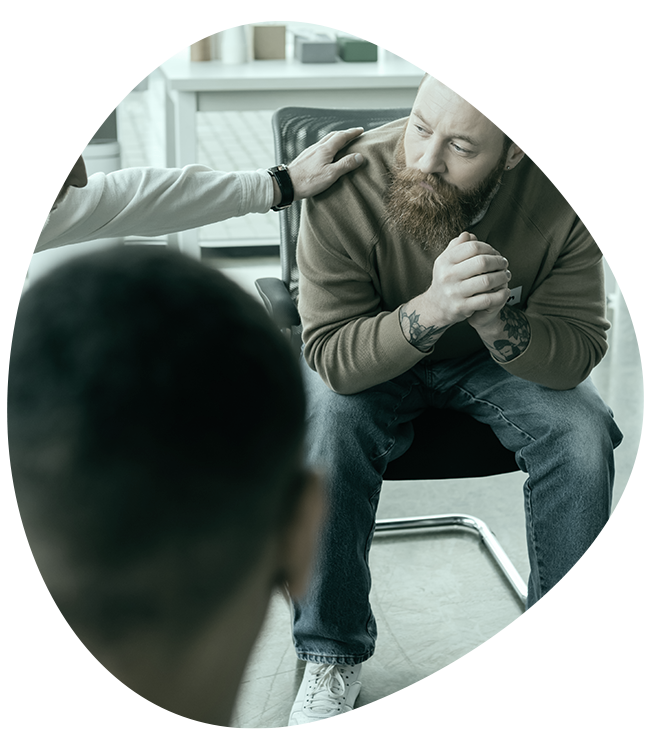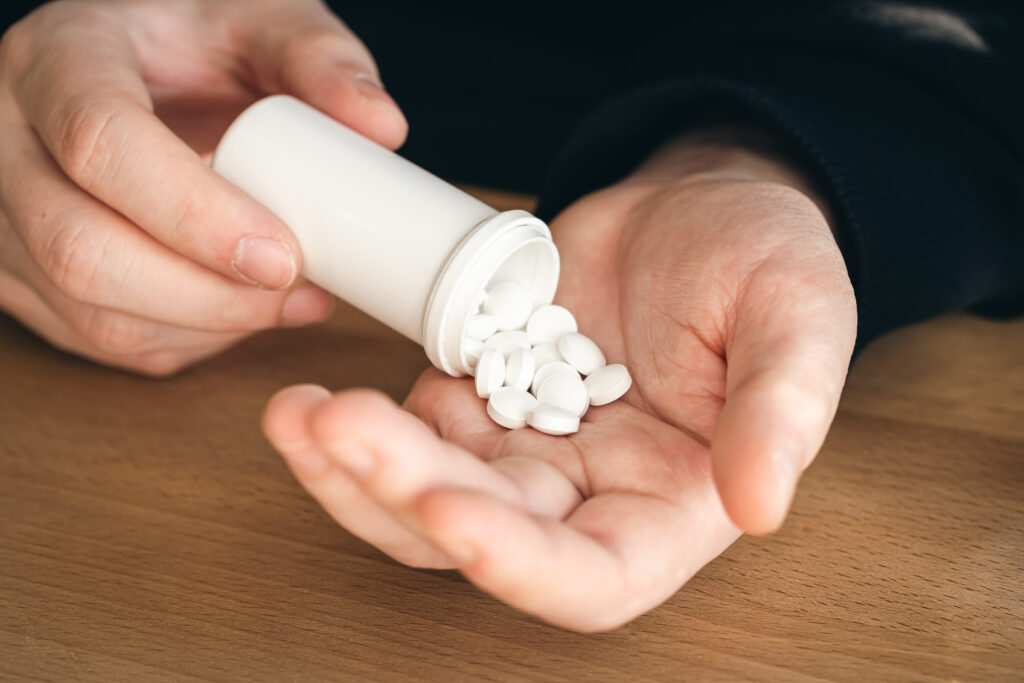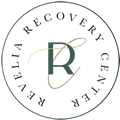Opiates addiction treatment in Spain
Overcome opiates addiction and begin a drug-free chapter today.


Overcome opiates addiction and begin a drug-free chapter today.

Get in touch with no commitment
Opiates addiction often begins with prescription pain medication or recreational drug use, but over time, it can lead to a physical and psychological dependence.
As dependence grows, the body becomes tolerant to opiates, meaning more of the drug is required to achieve the same effects. Individuals addicted to opiates often experience intense cravings and may go to great lengths to obtain the drug, even when it leads to harmful consequences.
Withdrawal symptoms such as nausea, sweating, irritability, and anxiety can make it difficult to stop using the drug without professional help.
Recognizing the signs of opiate addiction is an essential first step toward recovery. If you’re struggling with addiction, it’s important to seek professional treatment to help break the cycle. With the right support, including detox and therapy, it’s possible to regain control and rebuild a healthy, drug-free life.
Trustindex verifies that the original source of the review is Google. I was hospitalized for 3 weeks by my own decision, the care and treatment were excellent, the method is different from other centers and my experience was positive, the team is quite welcoming and professional.Trustindex verifies that the original source of the review is Google. Revelia Recovery Center is an amazing place for anyone struggling with addiction. The staff are really professional and caring. Lautaro, the psychologist, is incredibly helpful and makes you feel supported through the whole process. Sergio, the monitor, is always there with the right motivation and a positive attitude. The atmosphere at the center is welcoming, and the team feels like a family — they’re kind, down-to-earth, and genuinely want to help. If you or someone you know needs support, I can’t recommend Revelia enough. It’s truly a life-changing place.Trustindex verifies that the original source of the review is Google. Amaizing place they help me with my addiction Juancho had a big expirience and Pablo help me with my therapys. Thank you so muchTrustindex verifies that the original source of the review is Google. Revelia Recovery Center is an amazing place for anyone looking to overcome addiction. The staff is incredibly supportive, the programs are well-structured, and the peaceful environment really helps with the recovery process. They truly care about helping people rebuild their lives. Highly recommend it!Trustindex verifies that the original source of the review is Google. Great staff lovely location serene experience

Our recovery program offers a supportive, structured environment to help you focus on overcoming opiates addiction with 24/7 care and expert guidance.

Our detox program supports your physical recovery by safely removing the effects of opiates addiction with professional supervision and care.

Psychological therapy is a crucial part of our opiates addiction recovery program. Through individual and group sessions, we help you explore the psychological triggers behind your addiction.

Opioid addiction is one of the toughest battles a person can face. At Revelia Recovery Center, we not only understand the pain and the cycle of dependence, but we have dedicated our work to providing a proven, safe, and confidential way out.
Our center is a leader in opiates addiction treatment in Spain, offering personalized programs that address both physical dependence and the underlying emotional and psychological causes.
Opioids are highly addictive because of how they hijack the brain’s natural reward system.
Opioid substances work by binding to opioid receptors located in the brain, spinal cord, and gastrointestinal tract. This binding produces two key effects that rapidly lead to dependence and addiction:
With continued use, the brain adapts to the presence of the opioid, leading to tolerance (needing higher doses for the same effect) and physical dependence (experiencing painful withdrawal symptoms when the drug is stopped). This cycle solidifies the addiction.
If you or a loved one are struggling with opioid use, recognizing the signs is the essential first step toward seeking help. Opioid Use Disorder is diagnosed based on several key behavioral and physical indicators.
Type: Semisynthetic Opioid. Addiction Risk: Extremely high. Heroin reaches the brain very quickly and is converted into morphine, causing intense euphoria and nearly immediate physical dependence with continued use. It is a serious public health problem and requires intensive medical and psychological treatment.
Type: Synthetic Opioid. Addiction and Danger Risk: Maximum. Fentanyl is up to 50 or 100 times more potent than morphine. It is legally used for severe pain (patches or pills), but the illegally manufactured version is the main cause of the current overdose crisis in North America and represents a global threat. with minimal doses.
Type: Semisynthetic Opioid (Prescription). Addiction Risk: Very high. It is one of the most widely abused prescription pain relievers. Its original extended-release formulation (OxyContin) was a key factor in the beginning of the opioid crisis
Type: Semisynthetic Opioid (Prescription). Addiction Risk: High. It is also a very commonly prescribed pain reliever, often combined with paracetamol. Although generally considered less potent than oxycodone, its prolonged misuse leads firmly to physical and psychological dependence, requiring desensitization treatment.
Morphine (Natural Opioid). Addiction Risk: High. It serves as a benchmark for severe pain in hospital settings and is the base from which other opioids are derived. Its well-known potency, combined with extended-release formulations, leads to a rapid and powerful addictive potential. It requires intensive medical detoxification to manage severe withdrawal.
Type: Tramadol (Synthetic), Codeine (Natural). Addiction Risk: Moderate to High. They are considered weaker opioids, but their availability (especially Tramadol in certain regions) and the perception that they are “safer” have led to an increase in addiction cases. They still require medical treatment for detoxification and desensitization.
Revelia Recovery Center
Seeking treatment for opiates addiction in Spain can bring up many questions. Knowing what to expect can make the recovery journey feel more manageable.
To help, we’ve answered some of the most common questions about our opiates addiction treatment program in Spain. If you need more information, feel free to contact us.
Opiates detox involves safely managing withdrawal symptoms such as pain, nausea, anxiety, and cravings under medical supervision. The process helps the body adjust to functioning without the drug, ensuring comfort and safety throughout the detoxification phase.
The recovery process for opiates addiction typically takes several weeks or even months, depending on the severity of the addiction. Treatment includes detox, therapy, and ongoing support to help individuals achieve long-term sobriety and prevent relapse.
No. We are a non-religious opiates rehab center in Spain focused on providing professional and personalized treatment for methadone addiction, using evidence-based therapies and medical care.
The admission process at Revelia Recovery Center is designed to be smooth, supportive, and personalized. It begins with a free, confidential conversation where we provide all necessary information and answer your questions. We then gather details about your needs through a tailored assessment to create a personalized treatment plan. Our team assists with travel arrangements to our center in Tenerife and provides clear packing guidance. To secure your spot, a deposit is required, with flexible payment options available. Upon arrival, you’ll be warmly welcomed, undergo a brief check-in, and, if needed, start a supervised detox and adaptation phase. Once ready, your customized treatment program begins, combining therapy and holistic activities to support your long-term recovery.
Check our full admission process conditions.
The cost of opiates addiction treatment in Spain depends on various factors, including the type of program, the level of care required, and the duration of treatment. We offer personalized recovery plans designed to meet individual needs, with pricing that reflects the specific therapies and support provided. To help you understand your options, we’re happy to discuss your situation and provide detailed information—feel free to reach out for a confidential consultation.
Absolutely yes. This is one of the most dangerous misconceptions.
Addiction to Tramadol and Codeine is a serious and very common problem, precisely because the false perception exists that they are “safe.”
False Sense of Security: Because they are commonly used opioids (often prescribed for pain or coughs), people underestimate their addictive potential. They don’t carry the same stigma as morphine or heroin, but the mechanism of dependency is the same.
Tolerance Development: The body gets used to them, meaning a person will need to take increasingly larger doses to get the same pain relief or feeling, leading them into a cycle of dependence.
Availability: Their high availability (especially Tramadol in many regions) has led to a massive increase in addiction cases.
An addiction to Tramadol or Codeine is not “less serious”; it is a chemical dependency that requires the same professional medical treatment (detoxification and therapy) as any other opioid addiction.
Yes. From a medical and treatment perspective, the addiction is identical.
This is a critical point to understand. The brain does not care if the drug came from a doctor or from the street.
Identical Mechanism: Heroin is chemically converted into morphine inside the brain. They bind to the same opioid receptors, create the same euphoria, and cause the same physical dependence.
The “Slippery Slope”: Many individuals who develop a dependence on prescription painkillers (like OxyContin or Morphine) may switch to illicit opioids like heroin. This is often because the prescription becomes too expensive or difficult to obtain, and heroin provides a similar (though much more dangerous) effect.
Equal Treatment: Both addictions are treated as a severe Opioid Use Disorder. They require the same level of care, including medically supervised detoxification to manage withdrawal and comprehensive psychological therapy to address the roots of the addiction.
Find out about our last articles and news about our centers and everything related to addiction treatment and rehabilitation.
The final location is shared with the user to ensure privacy and security
